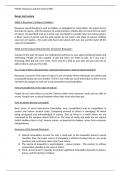PO201: Rousseau and the General Will
Recap: Last Lecture
What is Rousseau’s Critique of Hobbes?
Rousseau saw philosophers such as Hobbes, as apologists for materialism. He argues that in
the state of nature, with the absence of social practices, Hobbes did not reach the true state
of nature. He described man as a social man, but failed to consider how men being social is
a direct result of society and the polis (which do not exist in the state of nature). Hobbes
says men are egoists… this could only have come about with war, law and the state! All the
cause of socialisation.
What are the natural characteristics of man for Rousseau?
Humans in the state of nature are motivated by self-love so care about self-preservation and
well-being. People are also capable of pity but there are limits to pity. So if you saw a
drowning child, but you can’t swim, there may be a limit to your pity and you may not be
able to dive in and save the child.
As a result of these characteristics, what does Rousseau’s state of nature look like?
Rousseau’s account of the state of nature is one of beauty where individuals are solitary and
occasionally bump into one another. There is not really any social interaction as there are no
incentives for people to seek out social interactions and inequalities.
How are people free in the state of nature?
People do not need others to survive. Desires match what someone needs and are able to
create. People have a natural freedom where they want what they get.
How do people become corrupted?
Basic forms of social interactions (friendship, love, competition) lead to competition in
society and various societal ranks. Comparing yourself to others is damaging! All about
being recognised and acknowledged in society. End up living in a world where we are
consumed by the opinions others hold of us. The vices of vanity and pride are not natural
(which Hobbes claim to be). Human nature, as depicted by Hobbes, arises from economic
independence.
Summary of the Second Discourse:
1) Natural inequalities account for only a small part of the inequality found in actual
societies; thus, the major source of inequality is artificial coming from us, our social
practices and constructs rather than from nature.
2) The source of inequality is psychological – amour propre – the passion to achieve
comparative standing in the eyes of others
3) Third, amour propre’s capacity to produce significant inequalities depends on leisure,
luxury, and the division of labour
, PO201: Rousseau and the General Will
4) Social inequalities become properly entrenched, pervasive, and dangerous only with
the development of explicitly codified practices of private ownership.
5) As humans move from the state of nature to one in which there is political authority,
natural freedoms are lost and little dependence is gained in return:
‘Man is born free and everywhere he is in chains. One believes himself the
other’s masters, and yet is more a slave than they’. Rousseau.
Today’s Lecture:
Given Rousseau’s pessimism regarding political authority and the move away from the state
of nature, it would be logical to assume he desires a return to the state of nature. This is not
the case. Rousseau gives two reasons:
a) It is impossible to return to the state of nature once humans have been socialised
b) It is undesirable to return because socialisation has allowed people to enjoy a
number of valuable goods, including friendship.
This gives rise to a ‘Fundamental Problem’ in political philosophy which is to:
‘Find a form of association that defends and protects the person and goods of each
associate with all the common force, and by means of which each one, uniting with
all, nevertheless obeys only himself and remains as free as before’.
Essentially, the issue is to characterise a form of social interdependence which permits to
secure the benefits of political authority without sacrificing any freedoms which define our
nature. This problems takes seriously two features of human beings:
1) We are motivated by self-love
2) Human beings have an equal capacity for and interest in freedom
For Hobbes and Locke, the solution is simple. Political authority is the answer as it will
protect freedom once people have agreed to enter into it. Rousseau rejects this solution.
Whilst consent may explain why we should obey the state, it is also a betrayal of our
freedom:
‘To renounce one’s freedom is to renounce one’s quality as man, the rights of
humanity, and even its duties. There can be no compensation for someone who
renounces everything’.
Therefore, Rousseau’s answer to the ‘Fundamental Problem’ is a political association in
which each member ‘puts his person and all his power in common under the supreme
direction of the General Will’. In this society, political authority would rest on a shared
understanding of the common good.




